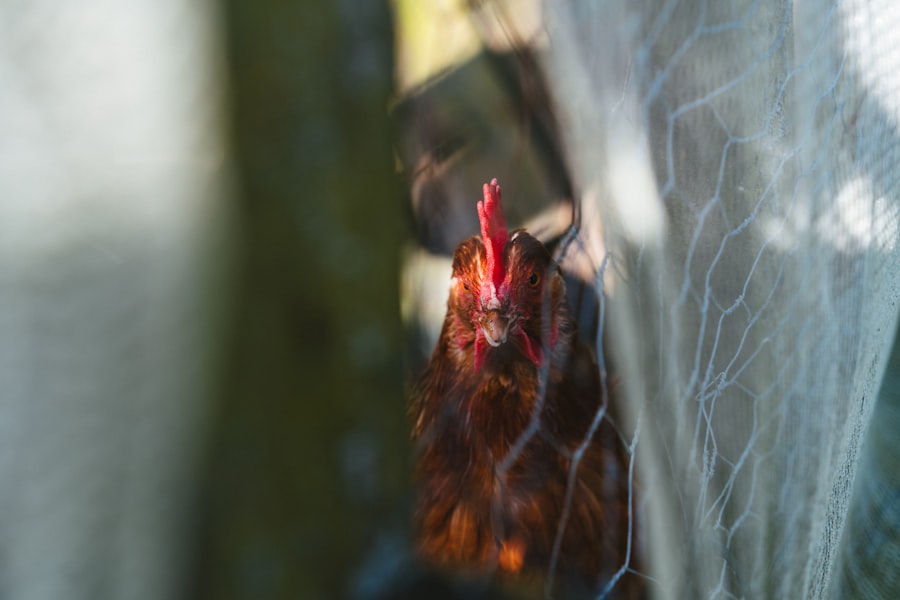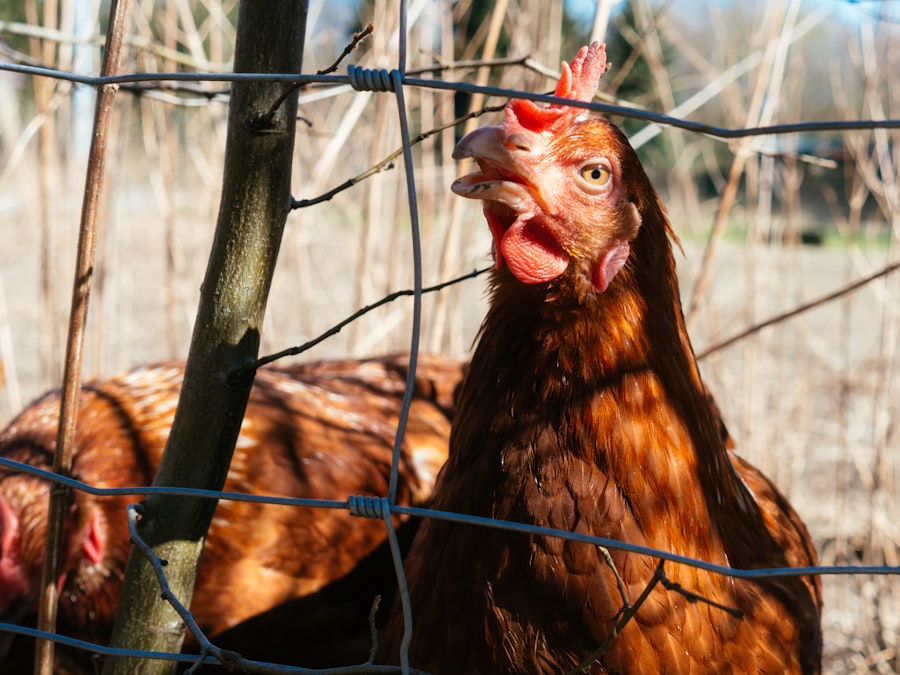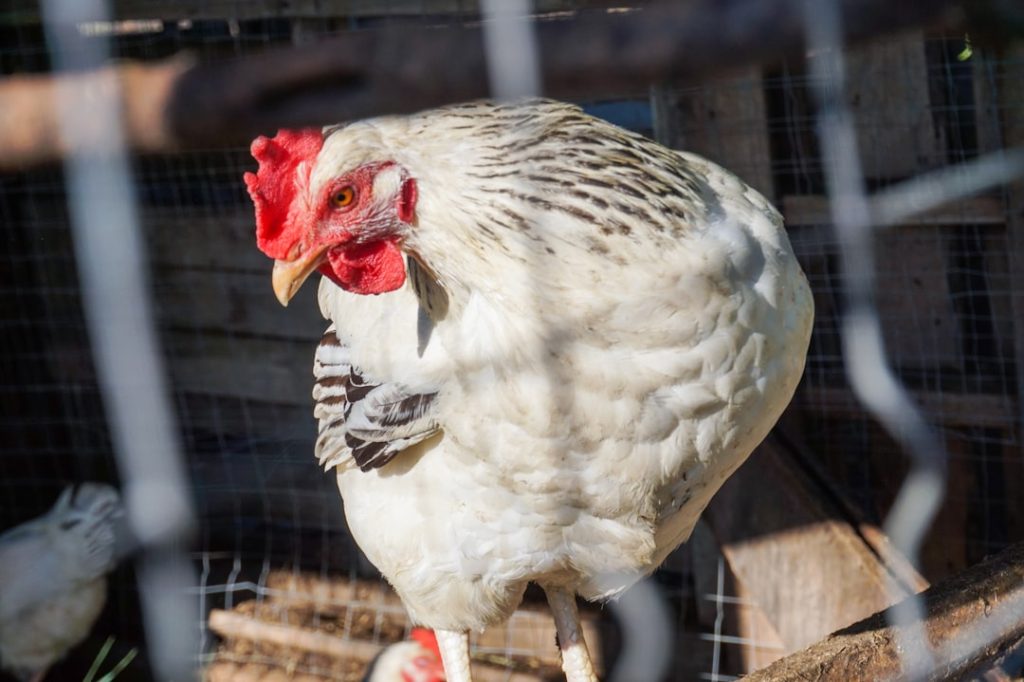Chickens are social animals with innate exploratory behaviors. They exhibit curiosity by pecking at the ground, scratching for food, and seeking elevated roosting spots. Understanding chicken behavior is crucial for providing a safe and suitable environment.
Chickens often display territorial tendencies, claiming specific areas as their own. They are naturally drawn to locations offering food and shelter, which may lead them to venture onto porches and other outdoor spaces. Within a flock, chickens establish a hierarchical social structure known as the pecking order.
This hierarchy influences their interactions with other chickens, humans, and animals. Dominant and submissive behaviors are common manifestations of this social dynamic. Recognizing and comprehending these social aspects of chicken behavior is essential for effective flock management and maintaining a harmonious environment for both chickens and their human caretakers.
Table of Contents
- 1 Creating a designated space for your chickens
- 2 Using barriers to keep chickens off the porch
- 3 Providing alternative sources of food and entertainment for chickens
- 4 Training chickens to stay away from the porch
- 5 Consistent reinforcement of boundaries
- 6 Seeking professional advice for persistent issues
- 7 FAQs
- 7.1 What are some effective ways to keep chickens off my porch?
- 7.2 Why is it important to keep chickens off my porch?
- 7.3 Are there any natural deterrents to keep chickens away from my porch?
- 7.4 How can I train my chickens to stay away from the porch?
- 7.5 What are the benefits of keeping chickens off my porch?
Key Takeaways
- Chickens have natural behaviors such as scratching, pecking, and dust bathing that should be understood and accommodated in their living space.
- Designating a specific area for chickens with proper shelter, food, and water is essential for their well-being and to keep them away from unwanted areas.
- Barriers such as fences, gates, or planters can be used to prevent chickens from accessing the porch and causing damage.
- Providing alternative food sources, such as a designated feeding area, and entertainment, such as hanging treats or toys, can distract chickens from the porch.
- Training chickens to stay away from the porch can be achieved through positive reinforcement, such as using treats, and consistent training sessions.
Creating a designated space for your chickens
Designating a Space for Chickens to Roam
To prevent chickens from wandering onto the porch, it is essential to create a designated space for them to roam and explore. This can be achieved by setting up a chicken coop or a fenced-in area where the chickens can safely spend their time. The designated space should provide ample room for the chickens to move around, scratch for food, and roost comfortably.
Meeting the Chickens’ Basic Needs
The designated space should also include areas for food and water, as well as shelter from the elements. When creating a designated space for chickens, it is important to consider their natural behaviors and needs.
Providing for Natural Behaviors
Chickens enjoy dust bathing, so providing a designated area with loose soil or sand can help satisfy this instinct. Additionally, including perches or elevated areas for roosting can provide the chickens with a sense of security and comfort.
By creating a designated space that meets the needs of the chickens, they are less likely to wander onto the porch in search of food or shelter.
Using barriers to keep chickens off the porch

One effective way to keep chickens off the porch is by using physical barriers to restrict their access. This can be achieved by installing a fence or gate around the porch area to prevent the chickens from entering. The barrier should be tall enough to prevent the chickens from flying or jumping over it, and sturdy enough to withstand any attempts to break through.
Additionally, it is important to ensure that there are no gaps or openings in the barrier that the chickens can squeeze through. Another option is to use temporary barriers such as chicken wire or netting to block off access to the porch. These barriers can be easily installed and removed as needed, providing a flexible solution for keeping chickens at bay.
It is important to regularly inspect and maintain these barriers to ensure that they remain effective in keeping the chickens away from the porch.
Providing alternative sources of food and entertainment for chickens
Chickens are naturally drawn to areas with food and entertainment, so providing alternative sources can help divert their attention away from the porch. This can be achieved by placing feeders and waterers in the designated chicken area, as well as scattering food around the space to encourage foraging behavior. Additionally, providing toys and enrichment activities such as hanging treats or mirrors can help keep the chickens occupied and entertained.
It is important to regularly replenish the food and water sources to ensure that the chickens are adequately nourished and satisfied. By providing alternative sources of food and entertainment, the chickens are less likely to seek out these resources on the porch, reducing the likelihood of them wandering onto this space.
Training chickens to stay away from the porch
Training chickens to stay away from the porch can be achieved through positive reinforcement and consistent training methods. This can be done by using treats or rewards to encourage the chickens to stay within their designated area and away from the porch. Whenever the chickens remain in their designated space, they can be rewarded with treats or praise to reinforce this behavior.
It is important to be patient and consistent when training chickens, as it may take time for them to learn and adapt to new behaviors. By using positive reinforcement techniques, such as clicker training or target training, chickens can be taught to associate staying in their designated area with positive rewards. With time and patience, chickens can learn to stay away from the porch and respect boundaries set by their caretakers.
Consistent reinforcement of boundaries

Monitoring the Designated Area
Consistent reinforcement of boundaries is essential in maintaining the behavior of chickens and preventing them from wandering onto the porch. This can be achieved by regularly monitoring the designated chicken area and ensuring that any barriers or deterrents are in place and effective.
Addressing Breaches and Redirecting Chickens
It is important to promptly address any breaches in boundaries and redirect the chickens back to their designated space. This helps to reinforce the understanding that certain areas are off-limits and prevents unwanted behavior.
Training and Interactions
Additionally, consistent reinforcement of boundaries can be achieved through regular training sessions and interactions with the chickens. By consistently reinforcing the rules and expectations for behavior, chickens can learn to respect boundaries and stay within their designated area.
Vigilance and Proactivity
It is important for caretakers to remain vigilant and proactive in maintaining these boundaries to prevent any unwanted behavior from occurring. By doing so, caretakers can ensure a safe and healthy environment for their chickens.
Seeking professional advice for persistent issues
In some cases, persistent issues with chickens wandering onto the porch may require professional advice and intervention. Seeking guidance from a veterinarian or animal behaviorist can provide valuable insights into managing the behavior of chickens and addressing any underlying issues. These professionals can offer tailored advice and strategies for managing chicken behavior, as well as identifying any potential health or welfare concerns.
Additionally, joining local poultry groups or seeking advice from experienced chicken keepers can provide valuable support and guidance in managing chicken behavior. By seeking professional advice for persistent issues, caretakers can gain a better understanding of their chickens’ behavior and implement effective strategies for preventing them from wandering onto the porch. In conclusion, understanding the behavior of chickens is essential for creating a safe and comfortable environment for them.
By creating a designated space, using barriers, providing alternative sources of food and entertainment, training chickens, and consistently reinforcing boundaries, caretakers can effectively prevent chickens from wandering onto the porch. In cases of persistent issues, seeking professional advice can provide valuable support in managing chicken behavior and ensuring their well-being. With patience, consistency, and proactive management, caretakers can successfully prevent chickens from accessing unwanted areas and create a harmonious environment for both the chickens and their human caretakers.
If you’re struggling to keep your chickens off your porch, you may also be interested in learning about how many eggs geese lay. Check out this article on Poultry Wizard to discover more about geese breeding and egg production.
FAQs
What are some effective ways to keep chickens off my porch?
Some effective ways to keep chickens off your porch include using physical barriers such as fences or chicken wire, using repellents such as citrus peels or vinegar, and training your chickens to stay away from the porch.
Why is it important to keep chickens off my porch?
Keeping chickens off your porch is important to maintain cleanliness, prevent damage to the porch, and ensure the safety of both the chickens and the porch occupants.
Are there any natural deterrents to keep chickens away from my porch?
Yes, natural deterrents such as citrus peels, vinegar, or even planting certain herbs like lavender or mint can help keep chickens away from your porch.
How can I train my chickens to stay away from the porch?
You can train your chickens to stay away from the porch by using positive reinforcement, such as providing treats when they stay away from the porch, and using gentle deterrents like a gentle spray of water when they approach the porch.
What are the benefits of keeping chickens off my porch?
Keeping chickens off your porch can help maintain a clean and tidy outdoor space, prevent damage to the porch, and reduce the risk of accidents or injuries caused by chickens on the porch.
Meet Walter, the feathered-friend fanatic of Florida! Nestled in the sunshine state, Walter struts through life with his feathered companions, clucking his way to happiness. With a coop that’s fancier than a five-star hotel, he’s the Don Juan of the chicken world. When he’s not teaching his hens to do the cha-cha, you’ll find him in a heated debate with his prized rooster, Sir Clucks-a-Lot. Walter’s poultry passion is no yolk; he’s the sunny-side-up guy you never knew you needed in your flock of friends!







